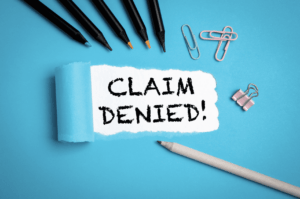
Dealing with the aftermath of a car accident is never easy, no matter how mild or severe the crash was. Even when you do everything by the book, companies can still deny your insurance claim for coverage. But receiving a denial decision doesn’t have to be the end of your case.
Reasons for Insurance denials
- If the responsible party has a lapsed policy, even for a few days, the insurers can state there was no coverage when the incident occurred.
- Your insurance might have coverage exclusions, meaning that certain situations aren’t cover, or the claim far exceeds the coverage policy.
- The time for coverage is quick to expire; tardiness to report the accident can result in a claim denial if enough time has passed.
- If either of you are excluded drivers, unnamed as an insured driver under the policy, the insurers will deny the claim compensation.
- Filing an exaggerated or fraudulent claim is grounds for immediate coverage rejection.
- fraudulent claim should be dealt with immediately after an accident. The insurance claim can be denied by stating that the incident didn’t cause the injuries.
- Drivers that get into accidents while breaking the law will have their insurance claim denied.
However, these insurance claim denials can be challenged. You can dispute a denial in several ways:
- Request a detailed letter that states, in a transparent manner, why your claim was denied. If your insurer made a wrong decision, this could help as evidence to fight it as a ‘bad-faith’ lawsuit.
- Collect all evidence, photos of the accident, police report, and eyewitness statements to support your appeal.
- File a complaint against the insurance company through the State’s Insurance Commissioner, who protects consumers by policing insurers to following the state’s laws.
Have you exhausted all these options? Contact a lawyer, and they will help you with legal advice and the next steps you should take.
Here is what the lawyer can do to help
- Your attorney might send a demand letter, a more formal compensation claim. It details your side of the story, why the other driver was at fault and the total amount of the vehicle damage and bodily injuries. The insurance company might respond by reversing its decision or offer a portion of the demanded compensation.
- Many insurance companies have an appeal process. Your attorney can maneuver through the insurer’s policies and even negotiate a settlement instead of an all-or-nothing compensation demand.
- If the insurance company denies your attorney’s claim, you could consider filing a lawsuit. However, not all cases are worth pursuing! A suit can end up being more costly than the incident’s damages. Listen to your attorney’s advice and make the choice that is right for you.
After any accident, act fast, exchange information, and call the insurers as soon as possible. If your claim gets denied, cover all your bases and go through the appeal process. When fighting a denial for compensation, it is advisable to seek a lawyer’s help through the denials’ process or what steps to take forward, whether a lawsuit or a compromise.



